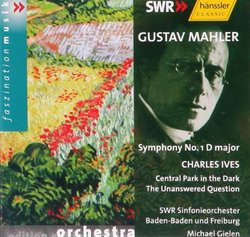| All Artists: Charles Ives, Gustav Mahler, Michael Gielen, SWF Sinfonieorchester Baden-Baden, SWR Baden-Baden and Freiburg Symphony Orchestra Title: Mahler: Symphony No. 1 in D major; Ives: Central Park in the Dark; The Unanswered Question Members Wishing: 0 Total Copies: 0 Label: Hanssler Classics Original Release Date: 1/1/2005 Re-Release Date: 8/1/2004 Genre: Classical Styles: Historical Periods, Modern, 20th, & 21st Century, Symphonies Number of Discs: 1 SwapaCD Credits: 1 UPC: 040888309727 |
Search - Charles Ives, Gustav Mahler, Michael Gielen :: Mahler: Symphony No. 1 in D major; Ives: Central Park in the Dark; The Unanswered Question
 | Charles Ives, Gustav Mahler, Michael Gielen Mahler: Symphony No. 1 in D major; Ives: Central Park in the Dark; The Unanswered Question Genre: Classical
|
Larger Image |
CD Details |
CD ReviewsA refreshing Mahler First in the Kubelik mold, plus some ima Santa Fe Listener | Santa Fe, NM USA | 10/27/2008 (4 out of 5 stars) "As conductor of the NY Phil. for a period near the end of his life, Mahler knew Central Park when Ives did, so Gielen makes an imaginative connection between the two. There's no overlap of musical idiom, of course, yet he's effective in both. Gielen by nature is a modernist-objectivist. He's more flexible than Szell, however, and less intense than Toscanini. Also, Mahler seems to inspire some original ideas in him, for better or worse.
Here it's mostly for the better. This is a Mahler First where Nature predominates at her most cheerful, and the brisk, unfussy way that Gielen begins the opening movement reminds me of Kubelik's insouciance (on DG and Audite). The squeaky woodwinds of the Baden-Baden und Frieburg orchestra even sound a bit like the charmingly rustic winds of the Czech Phil. There are some tentative moments, however, where Kubelik would have turned up the exuberance, and I wish Gielen didn't sail through the big climaxes so casually. On the other hand, there's a lot to be said for a conductor who doesn't refine this music to death a la Chailly and Boulez. The Scherzo is brisk and light-footed -- it swings along one beat to the bar -- an unusual choice in music that's usually played like a clomping peasant festival. I like the change of pace, though, and Gielen's quickness allows him to comfortably take all repeats. I am always waiting for someone to convey the lugubrious satire of the third movement, which is based on a drawing of forest animals forming a funeral cortege for a fallen hunter. Alas, Gielen is brisk and straight-faced. That's not necessarily a debit, but there's little contrast with the Landler that came before. The "Jewish band" section isn't played for parody but moves jsut as fast and merrily as the outer segments. I notice that the Gramophone reviewer had the same reactions, and the same recollection of Kubelik, but he was too kind to the orchestra's technical abilities in the finale, where they don't approach the gleaming ease and power of a major ensemble. Gielen keeps to his notion that this is lighter, more transparent music than what we usually hear, and it works. For once, the finale isn't overwrought. Anyone who juxtaposes Mahler and Ives can't help but draw comparison with Bernstein, who was consummate in both. Gielen again is less intense and atmospheric -- a surprise in Ives's two most atmospheric, if not haunted works. The objectivist approach offers a nice alternative, as the Gramophone notes, without being totally convincing." |

 Track Listings (6) - Disc #1
Track Listings (6) - Disc #1